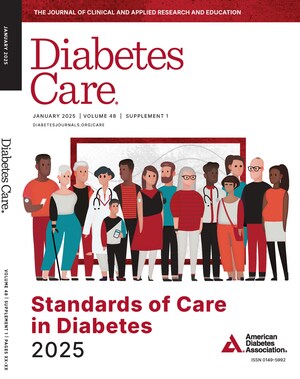ARLINGTON, Va., Dec. 15, 2016 /PRNewswire-USNewswire/ -- Psychological health, access to care, expanded and personalized treatment options, and the tracking of hypoglycemia in people with diabetes are key areas emphasized in the American Diabetes Association's (Association) new 2017 Standards of Medical Care in Diabetes (Standards). Produced annually by the Association, the guidelines focus on screening, diagnosis and treatment to provide better health outcomes for children, adults and older people with type 1, type 2 or gestational diabetes, and to improve the prevention and delay of type 2 diabetes. The Standards will be available online on Dec. 15, 2016, and will be published as a supplement to the January 2017 issue of Diabetes Care.
The Standards also include the findings of a new report on diabetes staging, titled "Differentiation of Diabetes by Pathophysiology, Natural History and Prognosis" (Differentiation), which is being published at the same time in Diabetes. Produced by a joint symposium of the Association, JDRF, the European Association for the Study of Diabetes and the American Association of Clinical Endocrinologists, the Differentiation report focuses on β-cell dysfunction and disease stage for type 1 and type 2 diabetes, and outlines approaches to define distinct subtypes of diabetes in order to achieve personalized diabetes care. The expert team of 16 international leaders examined the current available evidence on the various genetic and environmental routes that ultimately result in diabetes, and how these different pathways may be better characterized to allow precise, personalized treatment for people with diabetes. The complete article is being published online on Dec. 15, 2016 at http://dx.doi.org/10.2337/db16-0806, and in an upcoming print issue of Diabetes, the Association's journal on the physiology and pathophysiology of diabetes.
"This year, the Standards include critical, new evidence-based additions—psychosocial care, expanded physical fitness, metabolic surgery and hypoglycemia—all of which can impact effective diabetes care," said the Association's Chief Scientific and Medical Officer Robert E. Ratner, MD, FACP, FACE. "Together, the new Standards and the Differentiation report will guide health care providers and patients around the world in a multi-disciplinary approach to provide a comprehensive, individualized diabetes care plan—a plan that accounts for the whole patient and the many variables that can impact their ability to successfully manage diabetes, and thus leads to improved health outcomes."
The 2017 Standards of Care incorporate several new guidelines issued in 2016 by the Association, including those on physical activity, psychosocial health, metabolic surgery and hypoglycemia (low blood glucose). Some highlights from the new evidence-based clinical and research recommendations in the 2017 Standards are:
Assessment of psychological health and comorbidities
- Due to the greater risk of psychological/emotional stress and disorders in people with diabetes, the 2017 Standards include guidelines on screening adults and youth with diabetes for diabetes distress (unique emotional issues related to the burdens and worries of living with diabetes), depression, anxiety and eating disorders, and provide a list of situations that warrant a referral to a mental health specialist.
- The importance of assessing comorbidities (other illnesses a patient has in addition to diabetes) as part of a comprehensive patient-centered evaluation is also highlighted in the newly released Standards. An expanded list of diabetes comorbidities now includes autoimmune disease, HIV, anxiety disorders, depression, disordered eating behavior and serious mental illness.
Lifestyle management
- New lifestyle management guidelines in this year's Standards include a physical activity recommendation to interrupt prolonged sedentary behavior every 30 minutes. The Standards now also advise that providers assess patients' sleep patterns as part of overall diabetes care because sleep quality may be associated with blood glucose management.
Increased choice in treatment options
- The Association's recommendations on metabolic surgery for adult patients with type 2 diabetes have been revised. The Standards have expanded the indications for metabolic surgery to include patients with inadequately controlled type 2 diabetes who have a BMI as low as 30 kg/m2 (27.5 kg/m2 in Asian Americans).
- To provide more choices for people with diabetes who also have hypertension (high blood pressure), medication recommendations have been expanded in the Standards to now include four options as first-line treatment. According to the guidelines, any of the four classes of blood pressure medications that have shown beneficial cardiovascular outcomes in people with diabetes—ACE inhibitors, angiotensin receptor blockers, thiazide-like diuretics or dihydropyridine calcium channel blockers—may be used as initial therapy for hypertension.
- Included in this year's pharmacologic section is a new insulin algorithm, which offers more glucose management options for people with type 2 diabetes. A detailed care recommendation flow chart shows numerous pathways that may be considered for patients using insulin to meet their individual needs and A1C goals.
- Patients with diabetes and cardiovascular disease, which includes anyone with a history of stroke or heart attack, acute coronary syndromes, angina or peripheral arterial disease, are at high risk of serious complications and death. Based on the results from two large clinical trials, the Standards include a new recommendation to consider two specific glucose-lowering medications—the GLP-1 receptor agonist liraglutide and the SGLT-2 inhibitor empagliflozin—in this high-risk population to lower the risk of death. More research is needed to confirm if the heart benefits are a class effect or if the benefits persist in patients without established cardiovascular disease.
Additional important updates
- The Association has updated guidelines on hypoglycemia indicating that a level of less than 54mg/dl be defined as denoting serious clinically important hypoglycemia, whether that level is associated with symptoms or not, and that incidences of hypoglycemia within that range be reported during clinical trials and in clinical practice.
- To assist providers in addressing any concerns about medication costs that patients living with diabetes face, two detailed tables have been added to this year's Standards. Each table gives an estimate of the average monthly costs of glucose lowering medicines, both non-insulin and insulin, though the specific cost to the person with diabetes may vary.
- To help reduce health disparities, the Standards now recommend people with diabetes receive self-management support from lay health coaches, navigators and community health workers.
The Standards are established and revised annually by a Professional Practice Committee. The committee is a multi-disciplinary team of 12 leading experts in the field of diabetes care, and includes physicians, diabetes educators, registered dietitians and others who have experience in areas including adult and pediatric endocrinology, epidemiology, public health, lipid research, hypertension, preconception planning and pregnancy care. Members of the committee must disclose potential conflicts of interest with industry and/or other relevant organizations. The complete supplement will be published online at http://care.diabetesjournals.org/content/40/Supplement_1 on Dec. 15, 2016.
About Diabetes Care®
Diabetes Care is a monthly journal of the American Diabetes Association to increase knowledge, stimulate research, and promote better health care for people with diabetes. To achieve these goals, the journal publishes original articles on human studies in the following categories: clinical care, education and nutrition; epidemiology, health services; and psychosocial research; emerging treatments and technologies; and pathophysiology and complications. The journal also publishes the Association's recommendations and statements, clinically relevant review articles, editorials and commentaries. Topics covered are of interest to clinically oriented physicians, researchers, epidemiologists, psychologists, diabetes educators and other health professionals. Diabetes Care is the highest-ranked, peer-reviewed journal in the field of diabetes treatment and prevention.
About the American Diabetes Association
The American Diabetes Association is leading the fight to Stop Diabetes® and its deadly consequences and fighting for those affected by diabetes. The Association funds research to prevent, cure and manage diabetes; delivers services to hundreds of communities; provides objective and credible information; and gives voice to those denied their rights because of diabetes. Founded in 1940, the Association's mission is to prevent and cure diabetes, and to improve the lives of all people affected by diabetes. For more information, please call the American Diabetes Association at 1-800-DIABETES (1-800-342-2383) or visit diabetes.org. Information from both of these sources is available in English and Spanish. Find us on Facebook (American Diabetes Association), Twitter (@AmDiabetesAssn) and Instagram (@AmDiabetesAssn).
SOURCE American Diabetes Association
Related Links
WANT YOUR COMPANY'S NEWS FEATURED ON PRNEWSWIRE.COM?
Newsrooms &
Influencers
Digital Media
Outlets
Journalists
Opted In






Share this article